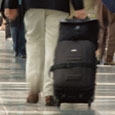The American Federation of Musicians has posted a petition on their website* encouraging musicians to urge passage of the Senate version of FAA Reauthorization Bill (S.1451) that will streamline the airlines’ carry-on policies regarding musical instruments. They state that “it is critical that all musicians weigh-in to demand that the Senate version (S.1451) of this language be included in the final bill.” Travel with instruments is fraught with peril as many musicians have found. Paula Robison shares a few travel stories from her facebook page.

Vicky Prothro Williamson: They called security because my Native American flutes could be weapons in disquise. They thought there were too much like a bat, and I could hurt someone with them!
James Strauss: I was arrested for four hours in Tel Aviv in 2006 because my flute was suspicious. After two hours of talk they put my flute through the x-ray machine. Then they asked me to play. I played the Bach Partita, then Syrinx, some choros by Pixinguinha, and for a finish improvised on Jerusalem of Gold. I sold five CDs.
Paula Robison: I had a similar experience. These guards were not so knowledgeable about Bach, however, they wanted to hear “La Cucaracha.” By the time I finished they were all dancing, and they let me through.
Steven Andre Dibner: I only had to play once, at the U.S. border coming back in from Canada. – Mozart and the Beatles as I recall.
Stephanie McGurren: There were about six flutists headed to Domaine Forget on my flight, and they all told customs they would only be in Canada for two weeks. I was staying longer, so, of course, I got pulled over for another, private interview with two Canadian customs officials. They asked me everything about the festivals, where I go to school, etc. They let me go eventually, but it was still annoying nonetheless.
Marina Piccinini: “I had to play the entire Bach Partita Allemande for a Munich security crew to convince them it was my instrument. Julie Baker couldn’t stop laughing when he heard about it.”
Cyndi Dacey: One time when I was flying from Dallas to Washington DC (and this was pre-9/11), the security team had to examine what was in my bag. I told them it was a flute, but they had to open it and see for themselves. As they took it out, I explained that they were holding the case upside down, and I started to put my hands out to grab it. Well that was a bad move. They called more security, as if I was causing a scene, when all I wanted them to do was open the case the right way. Almost to spite me they opened my beautiful flute upside down and it came tumbling out – on to the flute gig bag luckily. I was livid, and I had no recourse for their behavior.
Dustin Cramer: While departing Chicago for Normal, Illinois, security scanned my bag and saw an item that wasn’t allowed. I told them my flute was in the bag, and the security lady responded ‘Honey, when does a man play a flute? And anyway, I know what a flute is. You don’t have to tell me twice.’ The culprit was a small tube of toothpaste.
Bree Mills: One of the first times I flew with my flute, I went through the security scanner, and they asked me to step aside. I got out of line while they took my flute out of the bag. After trying to open the flute case for some time, the security officer turned to me and asked me to take it out because he couldn’t figure out how to do it.
Lisa Napier: I had to demonstrate that my flute was indeed a working instrument at Miami International. I received a nice round of applause for my Mozart!
Nancy Simons Horowitz: I told a security officer that there was a piccolo in my backpack, just as it approached the scanner. She looked at me like I was dumb, and said, ‘Listen honey, we all know what a piccolo is.’ Oh, excuse me! I scooped it up and all was well.
Viviana Guzman: While sitting on the tarmac in Bombay for a flight to London, we were delayed for an hour. The person sitting next to me on the plane asked me to play something to keep the plane uplifted (no pun intended) so I proceeded to play a fiery tango, after which I received a standing ovation from the whole plane!
Paula Robison: A few years ago Romero Lubambo, Cyro Baptista and I had a stopover in Miami on our way to the Cartagena Festival in Colombia. By chance, my husband was arriving in Miami on another flight to work with the New World Symphony. I knew his gate and arrival time, so we hid behind a partition with our instruments and as soon as Scott came through the door we started playing “Tico Tico.” We got an ovation too.
Amy Likar: I purchased an alto flute at the Nashville N.F.A. Convention, at which I also taught a Body Mapping workshop. On the way home, airport security asked if I had a pipe bomb (the alto flute) and if I was carrying human remains (plastic skeletal models). There had to have been enough flutes going through that airport for it to obviously be a joke, but they made me take everything out of the carry on bag. Since then I always check skeletal models, and T.S.A. always leaves me a note stating that they have searched the suitcase.
Christina Bellotta: One time, I was traveling overseas to the U.K. and was flagged at the security checkpoint because the x-ray of my flute bag looked suspicious. They pulled out my flute peg first and asked what it was, and I explained it was a peg for my flute. Then, they pulled out my metronome and tuner (with dials and red lights) and asked me what that was. I explained that the metronome keeps tempo for me and the tuner tells me if I am playing in tune. Then, they actually opened my flute case to inspect my instrument, and they ran the explosive material detector over it! They didn’t seem convinced it was a musical instrument until I offered to play it for them. I didn’t have to, but it was a colorful experience.
Marco Granados: When I started traveling with my Venezuelan music band, I was often asked if I could play tunes for security. On several occasions we did serenade them to Venezuelan Joropos and merengues, and in several instances, when I noticed difficult immigration officials in foreign countries, I would have CDs ready to give to them so that they would see that in fact I was going to play for festivals and such.
Dolores August: After you have a baby, things change. For years, I was interrogated and searched, my flute swabbed for explosives and opened upside down, and I endured my share of double glances from the x-ray inspector. Soon after 9/11 I had a baby. After that I went through security and, as usual, the x-ray belt stopped as they analyzed my bag. As they continued to look at me and my bag, I was preparing the usual explanation about my flute, only to have them say to me in a stern voice, ‘Ma’am, we are going to have to throw out your apple juice.’ Not a word about the large metal object.
Paula Robison: Once I was stranded in Dallas/Fort Worth by an East Coast blizzard. The only room was in a dumpy motel near the airport. I had to record the Hindemith Sonata in the following days, so I played it very, very softly in the bathroom with a towel over my head, hands, and flute, but all too soon there was banging at the door. ‘Stop that,’ a voice screamed. It gave me an interesting interpretive take on the piece, anyway.
Sungwoo Steven Kim: I was at Geneva International Airport for a flight to Boston that kept getting delayed due to weather. So I sat there for hours with my bag. Then for some reason, my metronome went off ticking…ticking…ticking…at about quarter equals 90. People started to look around and realized the ticking was coming from my bag. I tried to find it at the bottom of my flute bag, but it was difficult because I was in a panic. Finally I managed to turn it off. Since then, I make sure to take out the battery.
Mihi Kim: Right after 9/11, our flute quartet was flying, packed with alto and bass flutes. Our bass flutist was of Mediterranean origins. He had a 3-day beard and was wearing a a cotton headdress. He was asked by security guards with machine guns to open the black bass-flute bag. Finally, after the third check point in 120 feet, we decided that I should carry the big black case instead, and our situation got considerably better.
Marco Granados: I like to travel with most of my recording equipment: high-end ribbon microphones, recorder, mic stands, cables, holders, camera, etc., and I always get stopped because the ribbon microphones have big transformers inside that make them look (on the inside) like some kind of bombing device. They always want to take them out, swipe them, and test them in their machines. I have learned to tell them that I have microphones as well as recording equipment before I even check in, and for the most part they now leave me alone.
Gabe Boldin: (a trombonist) I was recently on a regional jet with my compact hard case and prepared to gate-check it. A flight attendant told me she was a music lover and thought musical instruments should never travel underneath a plane. She found a spot for it in the crew’s locker. If I hadn’t been already taken I might have asked her to marry me right then and there.
My teacher Ray Premru played in the Philharmonia Orchestra of London for 30 years and also toured with the Philip Jones Brass Ensemble. There was a time when European flight crews were supplied a list of instruments that were allowed in the cabins of planes. Ray knew this and whenever asked would tell them his instrument was an oboe. I guess that didn’t always work, because he was at least once told that he would not be able to carry his trombone on the plane that way. He said fine, took the instrument out of the gig bag, handed them the bag, and carried it on naked.
Lance Suzuki: Me: “Can I help you open that case?”
Security: “Step aside, sir.” (attempts to open case upside down!)
Me: “You step aside. What’s inside is probably worth more than your car.”






